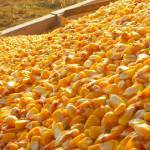Preventing Mold Problems in Horse Feeds

Oats, corn, and other grains contaminated with mold should never be fed to horses. Mycotoxins, the toxic substances produced by molds, can cause serious damage in the liver, brain, and other organs. To minimize problems with moldy feeds, follow these management practices.
- Buy feed from a reputable manufacturer. Feed mills have methods to inspect grain as it is purchased from growers, and grain that contains mold is rejected. Clean grain is stored and handled so that it does not become contaminated with mold.
- Store feed properly after it is purchased. Bagged feed should be stored in a cool, dry place so that it is not in contact with soil. Stored feed should be protected from insects and rodents.
- Feed should be used within a reasonable time after it is purchased. This timeframe varies, but a reasonable plan is to buy enough feed to last a few weeks.
- While it is unlikely that a fresh bag of feed will contain mold, horses will occasionally refuse feed that looks and smells fine to the owner. Some horses are sensitive to extremely minor changes in ingredient source, such as when a mill changes to a different molasses supplier. Regardless of the reason, refusal of feed by the horse may signal a problem, especially if more than one horse backs away from the meal.
- After horses are fed, remove any uneaten feed, especially from fence or ground feeders where grain may be exposed to weather. Leftover feed that becomes damp is more likely to mold than when the grain is kept dry.








